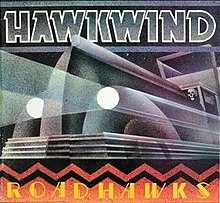Roadhawks
| Roadhawks | ||||
|---|---|---|---|---|
 |
||||
| Compilation album by Hawkwind | ||||
| Released | 1976 | |||
| Recorded | 1970–1975 | |||
| Genre | Space rock | |||
| Label | United Artists | |||
| Producer |
Dick Taylor (side 1, tracks 1, 2), Doctor Technical (side one, track 4), Doug Bennett (side two, track 3), Hawkwind |
|||
| Hawkwind chronology | ||||
|
||||
| Professional ratings | |
|---|---|
| Review scores | |
| Source | Rating |
| Allmusic | |
Roadhawks, is a 1976 compilation album by Hawkwind covering the years 1970-1975. The band referred to their live shows with the term "Roadhawks" for many years.. However, there is only one live song on the album. The inside cover includes a shimmering photograph of the band in concert that appears to feature frozen strobe lights.
The tracks are mostly in chronological order; "You Shouldn't Do That" was originally released on Hawkwind's second album, In Search of Space. The music was compiled and remixed by Dave Brock and included "Silver Machine" and "Urban Guerilla", which had previously been available only as singles. The album reached #45 on the UK album charts.
A previously unreleased live version of "You Shouldn't Do That"/"Seeing It As You Really Are" is included on this album. This performance was taken from the same live show where the bulk of Space Ritual was derived. This track would likely have been included in the original release of that seminal live album except for a break in the recording (which was filled during the remixing with a simple instrumental interlude). The song is now included as a bonus track on CD reissues of the Space Ritual album.
This album was a favorite of many early Hawkwind fans due to the inclusion of standout tracks and the seamless feel that left no breaks between songs. Also, many of the band's early albums were difficult to locate in the U.S. In particular, "Wind of Change" and "The Golden Void" are preferred by many listeners in their setting on this album as opposed to their placement on the original albums. These two songs also serve as a sort of test of the reproduction capabilities of an audio system, with the extremely low bass tones on the former song and the shrill opening riffs on the latter song overwhelming many sound systems.
...
Wikipedia
